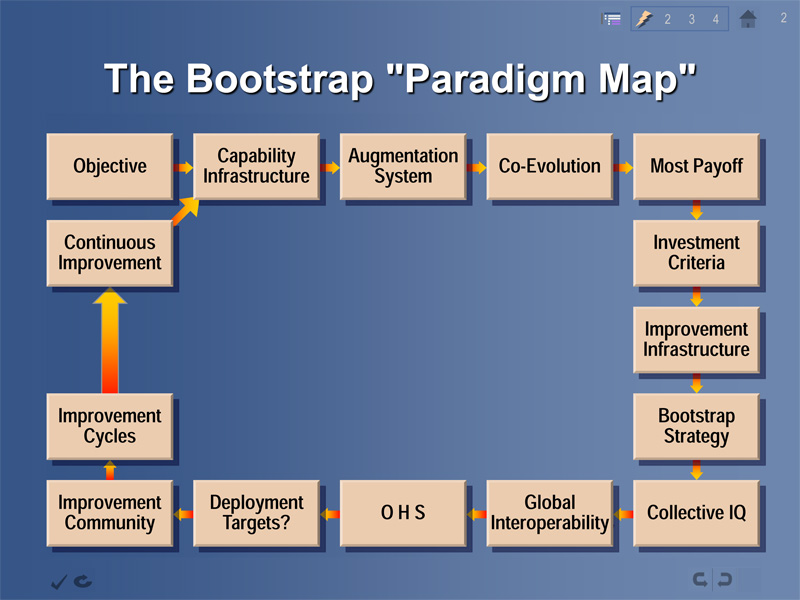|
![]()
| Doug Engelbart's Vision What1 #31458 Augment Collective IQ to help address the complex, urgent problems humanity faces. | 
"The complexity and urgency of the problems faced by us earth-bound humans are increasing much faster than are our aggregate capabilities for understanding and coping with them. This is a very serious problem; and there are strategic actions we can take, collectively. 1 Consider a community's "Collective IQ" to represent its capability for dealing with complex, urgent problems – i.e., to understand them adequately, to unearth the best candidate solutions, to assess resources and operational capabilities and select appropriate solution commitments, to be effective in organizing and executing the selected approach, to monitor the progress and be able to adjust rapidly and appropriately to unforeseen complications, etc. 2 I contend that a strategy for "facilitating the evolution" of our organizations' Collective IQs will be the optimum approach, aka a bootstrapping strategy. 3 |
+Citaten (5) - CitatenVoeg citaat toeList by: CiterankMapLink[3] Augmenting Human Intellect: A Conceptual Framework
Citerend uit: Douglas C. Engelbart
Publication info: 1962 October
Geciteerd door: David Price 10:45 PM 21 August 2013 GMT
Citerank: (1) 278410Doug EngelbartDouglas Carl Engelbart (January 30, 1925 – July 2, 2013)7F1CEB7
URL: | | Fragment- By "augmenting human intellect" we mean increasing the capability of a man to approach a complex problem situation, to gain comprehension to suit his particular needs, and to derive solutions to problems. Increased capability in this respect is taken to mean a mixture of the following: more-rapid comprehension, better comprehension, the possibility of gaining a useful degree of comprehension in a situation that previously was too complex, speedier solutions, better solutions, and the possibility of finding solutions to problems that before seemed insoluble. And by "complex situations" we include the professional problems of diplomats, executives, social scientists, life scientists, physical scientists, attorneys, designers--whether the problem situation exists for twenty minutes or twenty years. We do not speak of isolated clever tricks that help in particular situations. We refer to a way of life in an integrated domain where hunches, cut-and-try, intangibles, and the human "feel for a situation" usefully co-exist with powerful concepts, streamlined terminology and notation, sophisticated methods, and high-powered electronic aids.
Man's population and gross product are increasing at a considerable rate, but the complexity of his problems grows still faster, and the urgency with which solutions must be found becomes steadily greater in response to the increased rate of activity and the increasingly global nature of that activity. Augmenting man's intellect, in the sense defined above, would warrant full pursuit by an enlightened society if there could be shown a reasonable approach and some plausible benefits.
This report covers the first phase of a program aimed at developing means to augment the human intellect. These "means" can include many things--all of which appear to be but extensions of means developed and used in the past to help man apply his native sensory, mental, and motor capabilities--and we consider the whole system of a human and his augmentation means as a proper field of search for practical possibilities. It is a very important system to our society, and like most systems its performance can best be improved by considering the whole as a set of interacting components rather than by considering the components in isolation. |
Link[4] Improving Our Ability to Improve: A Call for Investment in a New Future
Citerend uit: Douglas C. Engelbart
Publication info: 2003 September
Geciteerd door: David Price 10:48 PM 21 August 2013 GMT
URL:
| | Fragment- In the past fifty years we have seen enormous growth in computing capability – computing is everywhere and has impacted nearly everything. In this talk, Dr. Douglas Engelbart, who pioneered much of what we now take for granted as interactive computing, examines the forces that have shaped this growth. He argues that our criteria for investment in innovation are, in fact, short-sighted and focused on the wrong things. He proposes, instead, investment in an improvement infrastructure that can result in sustained, radical innovation capable of changing computing and expanding the kinds of problems that we can address through computing.
In this talk, Dr. Engelbart describes both the processes that we need to put in place and the capabilities that we must support in order to stimulate this higher rate of innovation. The talk closes with a call to action for this CoEvolution Symposium audience, since this is a group that has both a stake in innovation and the ability to shape its direction. � |
|
|